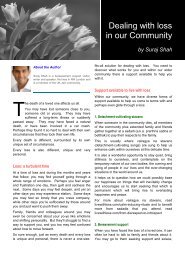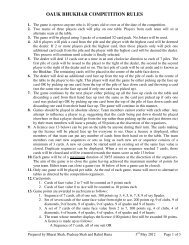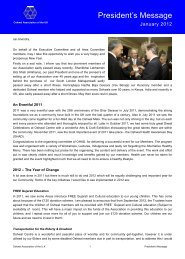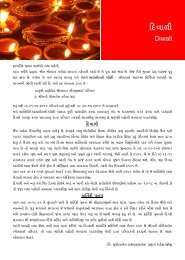OshwalNewsI - Oshwal Centre
OshwalNewsI - Oshwal Centre
OshwalNewsI - Oshwal Centre
You also want an ePaper? Increase the reach of your titles
YUMPU automatically turns print PDFs into web optimized ePapers that Google loves.
X<br />
X<br />
X<br />
X<br />
X<br />
X<br />
X<br />
X<br />
X<br />
X<br />
X<br />
X<br />
X<br />
X<br />
X<br />
X<br />
X<br />
X<br />
X<br />
Happy Diwali - <strong>Oshwal</strong> News<br />
STORY TIME<br />
Conquer<br />
Your Body :<br />
Do Not<br />
Surrender It<br />
Living in this atmosphere of materialism, it is<br />
rather difficult for us to understand the<br />
importance of the Jain teaching of nonpossessiveness<br />
(APARIGRAH). The<br />
contentment and happiness that comes from<br />
possessing only the essential things in life can<br />
only be experienced. Here is a story that<br />
illustrates this concept.<br />
Once there lived a monk (Sadhu) in a remote<br />
jungle. He lived by himself and had nothing to<br />
worry about. He had only two sets of clothes.<br />
Everyday, he used to wash one set of clothes<br />
and wore the other set. He lived in a modest<br />
hermitage, ate ripe fruits and fresh<br />
vegetables, and enjoyed the fresh air. He was<br />
happy and satisfied with the bare necessities<br />
of life.<br />
The monk lived alone, away from family,<br />
relatives, friends or foes. He spent most of his<br />
time in prayer and meditation, and study and<br />
recitation of scriptures. He did not own<br />
anything and no worries of losing any<br />
possessions. He had no attachment and no<br />
displeasure. He had full control over his<br />
senses. He had gained scriptural knowledge<br />
and had attained a high spiritual status. But<br />
he had no ego or pride. His character was his<br />
spiritual power. All those who approached<br />
him in times of need were inspired and<br />
comforted by his life of simplicity, modesty<br />
and morality.<br />
34<br />
His fame reached the royal court. The king<br />
was intrigued by the stories about the monk.<br />
So he decided to visit him in the jungle. He<br />
was impresses by the spiritual status and<br />
peace of mind attained by the monk. The king<br />
was very happy to see the monk. In return,<br />
the king granted a piece of land to the<br />
hermitage.<br />
The king started coming to the monk for more<br />
knowledge, guidance and peace of mind. He<br />
would bring various gifts for the monk,<br />
thinking that the monk needed them and that<br />
they would make the monk’s life more<br />
comfortable. The king gave a farm, cows and<br />
other farm animals. He hired a number of<br />
servants to take of the cows, and to plough,<br />
sow the seeds, irrigate and fertilize the land.<br />
Now the monk had all amenities of life -<br />
delicious food, fancy clothes, gold, diamonds<br />
and pearls given by the king as tokens of<br />
admiration. Since the king visited the monk<br />
so often, the common people followed suit.<br />
Now the monk had many things to take care<br />
of and protect. He spent considerable time in<br />
looking after the hermitage, the farm and<br />
other property. He was concerned that<br />
somebody may steal his precious things. He<br />
was scared to lose his means of comfort.<br />
Being concerned about materialism, he had<br />
very little time for his spiritual pursuit. He<br />
began to have nightmares. He lost his sleep,<br />
appetite and health. He became oblivious of<br />
the natural beauty around him. Earlier, the<br />
monk had conquered his material desires.<br />
Now he had surrendered to them. The king<br />
and the monk’s other followers noticed the<br />
change in his attitude and character. So the<br />
monk lost their respect too.<br />
Living in this atmosphere of materialism, it is<br />
rather difficult for us to understand the<br />
importance of the Jain teaching of nonpossessiveness<br />
(APARIGRAH). The<br />
contentment and happiness that comes from<br />
possessing only the essential things in life can<br />
only be experienced.<br />
As retold by Harshad A Mehta, USA<br />
"Imagine life as a game in which you are juggling five balls in the air. You<br />
name them -- work, family, health, friends and spirit -- and you're keeping<br />
all of these in the air. You will soon understand that work is a rubber ball.<br />
If you drop it, it will bounce back.<br />
But the other four balls -- family, health, friends and spirit -- are made of<br />
glass. If you drop one of these, they will be irrevocably scuffed, marked,<br />
F<br />
nicked, damaged or even shattered.<br />
They will never be the same. You must understand that<br />
and strive for balance in your life."<br />
An excerpt from a speech given by the CEO of Coca Cola:
















